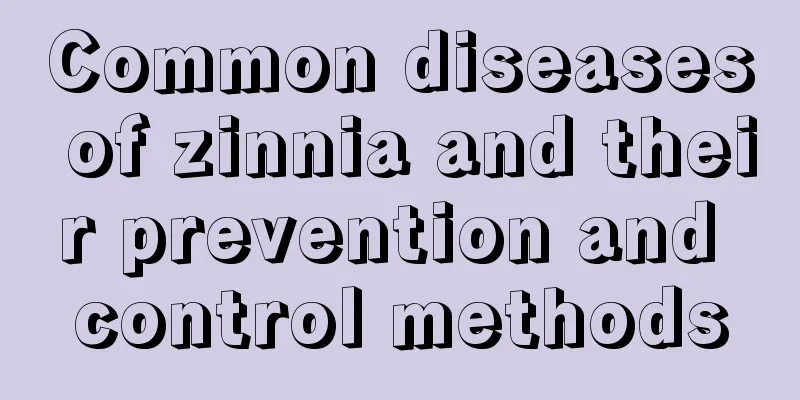Common diseases of zinnia and their prevention and control methods

Common diseases of zinnia: white star diseaseSymptomsDisease on leaves. Initially, small dark brown spots appear, which later become lesions with dark brown edges and grayish white centers, with a diameter of 2-4 mm. The disease mostly occurs on the lower leaves, and in severe cases the leaves curl and wither. There is dark green mold on the surface of the lesion. Prevention and treatment methodsStrengthen management and apply sufficient fertilizer, cultivate strong seedlings, provide shade to prevent rain, water in time after planting, and prevent flooding. Improve greenhouse ventilation and reduce humidity. Remove diseased and damaged parts promptly. In the early stage of the disease, remove the diseased leaves in time and then spray pesticides immediately for prevention and control. You can use 1:0.5:200 Bordeaux mixture plus 0.1% sulfur powder, or 500 times of 65% Zineb wettable powder, or 500-800 times of 75% Thiophanate-methyl wettable powder, or 800-1000 times of 50% Mancozeb. Common diseases of zinnia: black spotSymptomsZinnia black spot disease is also known as brown spot disease. It happens all over the country. The leaves of infected plants turn brown and dry, the petals shrink, and the leaves, stems, and flowers can all be harmed by this disease. Small dark brown spots initially appear on the leaves, which soon expand into large regular spots with a diameter of 2 mm to 10 mm and a reddish brown color. As the spots expand and increase in number, the entire leaf turns brown and dries up. The disease starts at the base of the petiole on the stem and develops longitudinally, becoming dark brown stripes. The symptoms of floral damage are similar to those of leaves, and the petals soon shrink and dry up. During the seedling stage, when the base of the stem is affected, dark brown ulcers with sunken centers are formed. The spots gradually surround the stem, causing the seedlings to show symptoms of damping-off disease. Prevention and treatment methodsSeeds must be disinfected before sowing (use 1000 times diluted 50% carbendazim wettable powder to soak the seeds for 10 minutes). After autumn, diseased leaves, diseased stems, etc. are destroyed in batches to eliminate the source of infection for the next year. Save seeds from healthy, disease-free mother plants. Spray with 50% Zineb or 5000 times diluted Mancozeb. When spraying, pay special attention to spraying evenly on the back of the leaves. Common diseases of zinnia: mosaic diseaseSymptomsIt occurs all over the country, often causing plants to be stunted and degenerate. In the early stages of the disease, the leaves appear slightly mottled, which later develops into light or dark green mottled disease. Symptoms are more obvious on new leaves. Prevention and treatment methodsKilling aphids and preventing diseases has a certain control effect on zinnia mosaic disease. We should also pay attention to field hygiene management and eradicate diseased plants to reduce sources of infection. |
<<: Common diseases and pests of Prunus mume and their control methods
>>: What diseases does Hylocereus spp.
Recommend
How to grow lotus
1. Water Usually it has a higher requirement for ...
How to plant purple jasmine seeds
Seed collection If you want to grow beautiful pur...
What is the optimum temperature for the growth of Chinese cabbage?
Temperature requirements for growing Chinese cabb...
How to grow moonflower
1. Sufficient sunlight is required An environment...
Precautions for the maintenance of crape myrtle
one. Watering The crape myrtles grown in pots at ...
Can canna be grown hydroponically?
Can canna be grown hydroponically? Canna can not ...
Where is the most authentic Wuchang rice? Where is the real Wuchang rice produced?
Wuchang rice is the best staple food for making r...
Celery pest and disease control
Disease control Common diseases: soft rot, soft r...
What fertilizer is good for sesame topdressing?
Sesame topdressing time During the period of flow...
Dinotefuran usage and dosage
Dinotefuran is a type of neonicotinoid pesticide....
How to propagate Gem Flower and what to pay attention to
Gem flower reproduction method The main ways of p...
When does Calla Lily bloom?
1. Flowering period It starts blooming in Novembe...
How to make water and drought bonsai (with pictures)
Water and drought bonsai production: material sel...
How to grow Chinese evergreen so that it can bloom
1. Breeding methods: 1. Environment: If you want ...
These 10 kinds of flowers grow better the cooler the environment, and they can bloom even without sunlight!
White Anthurium Anthurium is a super shade-tolera...









